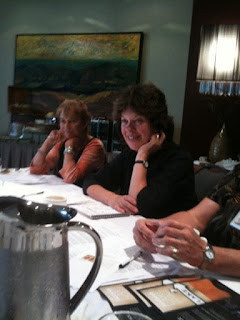That was the message of hope that Chef Barton Seaver brought to a room full of travel media and industry professionals, Saturday.
Seaver, author, National Geographic Fellow, TED speaker and chef extraordinaire, is passionate about cooking and conservation - and he believes eating well and living sustainably are not mutually exclusive activities.
 |
| Smoked trout with greens. |
Barton explained one of the ways we can do that is by eating lower down the food chain. When it comes to eating fish, for example, if we eat that way, we not only impact the environment less, we also eat healthier (toxins accumulate and multiply the higher up the chain we go) - and we also help create an economic system that is more sustainable.
Or as he put it, " If we put our demand in the right place, we create sustainable economic systems."
He pointed out that while the effect might not be felt immediately, it would pay dividends down the road.
In other words, while we can eat fish that are apex predators - tuna, shark, etc. - we should be choosing to eat fish lower down in the food chain - mackerel, sardines, and other species like that - more often, to create both economically and environmentally sustainable systems.
Barton does not just deliver the message - he lives it.
One time, a supplier delivered what was essentially bait - boxes full of flying fish - to his restaurant. Rather than throw it out, Barton created a dish from it that became the talk of the town.
He continues to try to source food that is more sustainable, and creates ways to cook and present that food for discerning consumers.
 |
| Smoked mackerel and cream cheese spread. |
The afternoon was both inspiring and entertaining.
As someone who grew up in a Washington, D.C. neighbourhood that was extremely diverse in terms of its cultural mix, and hence, its food, Barton learned that, "Food is how we understand culture."
After listening to him - and sampling some of his food - I understand a little more about our place on the planet.
And I feel a bit more "cultured," too.
Some words of wisdom from Chef Barton Seaver.

